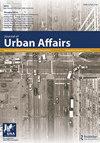为“防气候”住房融资?佛罗里达PACE融资的前提和陷阱
IF 1.9
3区 经济学
Q2 URBAN STUDIES
引用次数: 0
摘要
随着人们对美国住房市场面临的气候风险的担忧日益增加,对房屋进行物理改造的策略越来越受到关注,其中包括如何解决像佛罗里达这样高度暴露的地区的住房再保险/保险和负担能力的交叉危机的争论。我们考虑了一个重要但研究不足的“防气候”战略的例子:住宅物业评估清洁能源(PACE)融资。虽然PACE历来为脱碳改造提供资金,但它正越来越多地用于促进佛罗里达州减少飓风风险。本文介绍了PACE的基本特征、演变用途和争议。在探讨佛罗里达州的案例时,我们研究了两种更深层次但尚未得到充分研究的金融紧张局势:PACE与其他形式的房地产相关融资(以及潜在的系统性崩溃)的交叉点,以及随着房主在其他不断增长和交叉的气候/气候应对成本中遇到新债务而不断上升的负担能力断点。这些问题需要对城市改造及其资源进行更具变革性的想象。本文章由计算机程序翻译,如有差异,请以英文原文为准。
Financing “climate-proof” housing? The premises and pitfalls of PACE finance in Florida
Amidst growing concerns about climate risks to the U.S. housing markets, strategies to physically retrofit homes are gaining attention—including within debates over how to resolve intersecting crises of housing re/insurability and affordability in highly exposed sites like Florida. We consider an important but under-studied example of this “climate-proofing” strategy unfolding today: Residential Property Assessed Clean Energy (PACE) finance. While PACE has historically financed decarbonization retrofits, it is increasingly being deployed to facilitate hurricane risk reduction in Florida. In this paper, we introduce PACE: its basic characteristics, evolving uses, and controversies. Exploring the Florida case, we examine two deeper but as yet under-examined financial tensions: PACE’s intersections with other forms of property-linked finance (and potential systemic breakdowns) and rising affordability breakpoints as homeowners encounter its new debt amidst other growing and intersecting climate/climate response costs. These issues call for more transformative imaginaries of urban retrofitting and its resourcing.
求助全文
通过发布文献求助,成功后即可免费获取论文全文。
去求助
来源期刊

Journal of Urban Affairs
URBAN STUDIES-
CiteScore
5.40
自引率
4.80%
发文量
156
期刊介绍:
Focusing on urban research and policy analysis, the Journal of Urban Affairs is among the most widely cited journals in the field. Published for the Urban Affairs Association, the journal offers multidisciplinary perspectives and explores issues of relevance to both scholars and practitioners, including: - Theoretical, conceptual, or methodological approaches to metropolitan and community problems - Empirical research that advances the understanding of society - Strategies for social change in the urban milieu - Innovative urban policies and programs - Issues of current interest to those who work in the field and those who study the urban and regional environment
 求助内容:
求助内容: 应助结果提醒方式:
应助结果提醒方式:


